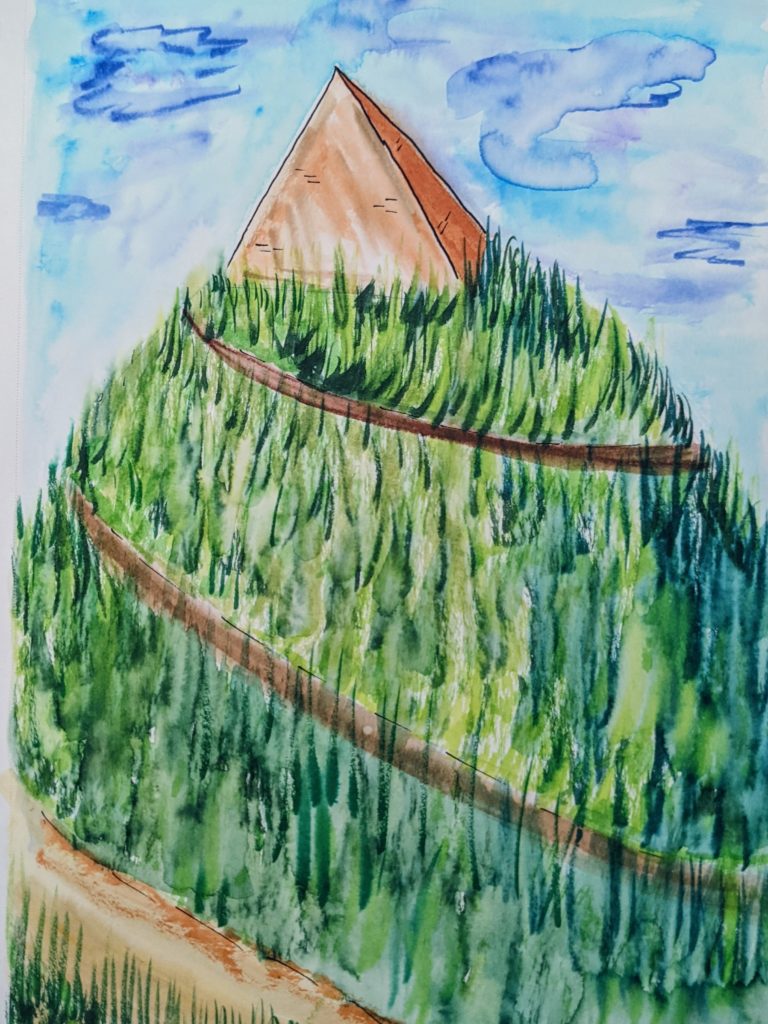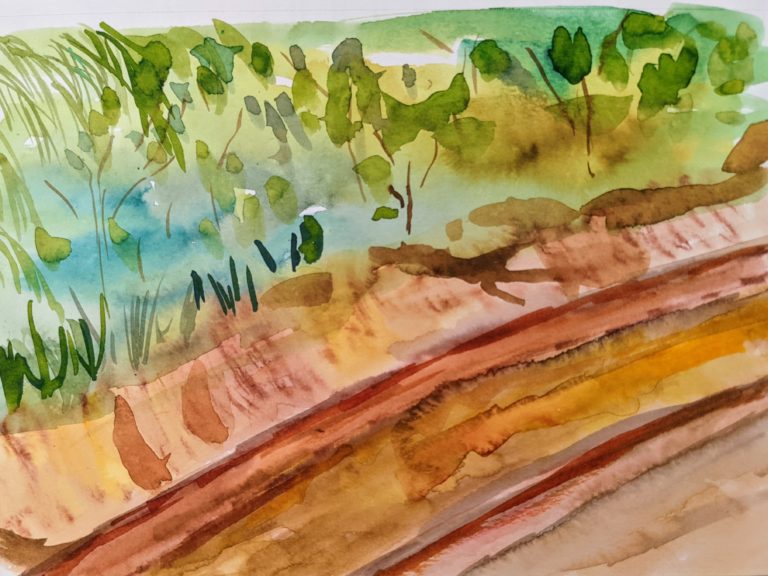I put away the stories of the past for a while, because the present was filled with activity and the past can seem such a blockade in the way of moving forward. Recently I had my dream again. The recurring dream I had for most of my teenage years. The dream that spurred depression and my desire to not long be present on earth anymore. I decided I better go back to unpacking that blockade of the past and show my unconscious self that I will not let it bother me, because I can talk about it.
This recurring dream that I have was a pyramid on a hill with a road that wound all the way around it. The road was long and over grown so a man could be fully concealed. Something always happened in the pyramid, not always something I was aware or an event that changed. The part that was always the same was my family on a bike escaping this pyramid and speeding downhill while soldiers emerged from the grasses to try and stop us. We would weave around them at top downhill speeds and the dream would end with a loud cocking of a gun in my ear. I would always awake then, never knowing if we survived or it that was the moment I died.

Before I unpack the blockade with adult me, there is one more story from this time frame. A story from the eyes and words of 10-year-old me. It is far milder than it really was, but my audience was an elementary magazine. I left out a number of big events, but it still covers some of the reasons I have PTSD.
31 Days of Trouble
Zaire (now known as Democratic Republic of Congo) is a country full of trouble. We waited two weeks in Bangui (the capital of Central Africa ) because the border was closed. After two weeks we put the bike across two dug out canoes. It was ten minutes ride across the Ubangui river to the Zairian side. The people were friendly enough at the border post. They did our paper work and said, they wanted to search us. They searched us and found a small handgun. My Dad tried to explain to them, that the barrel was partially blocked and it would not hurt anyone. They did not believe it so they kept it till the next day. The following day my Dad told the Army Commander to shoot his hand. The Commander shot my Dad’s hand and all that he saw was some red spots. They saw that it was all right so the Commander let us go and said, we should keep the pistol in our pocket for protection.
The road wasn’t too bad at the beginning but after a while there was a lot of mud holes, difficult bridges and deep-water troughs. We had dig to make paths wider or dig channels to let the water out of deep holes. Sometimes, we had to cut branches to put in troughs that were too deep or places that were very muddy. There were also a lot of bad bridges. Some were only two logs. Others were of more logs with lots of gaps in between. We had to cut bamboo and find small logs to fill them in. Sometimes we only had half of each of our tyres on the logs with nothing in between. Other bridges were old broken planks across the steel framing of once a good bridge. On that kind of bridge you have to move planks around the place and leapfrog across.
In Zaire there was hardly any food. The fruit that they’re got is only pineapples, avocados and bananas and, if you’re lucky, oranges. There is something nice there- the peanut butter. It was sold by spoon and put into large leaves. But there was one problem-nice peanut butter but stale bread. They also had rice in Zaire, but they would dry it on the side of the roads so it was full of stones. No matter how much Mum tried to clean it my Mum and Dad still broke their teeth. There was not much to put with the rice except some small onions and tomatoes and, near the Rwandan border, potatoes and cabbages. But we were lucky, as some friends of ours in Camaroon had given us a carton of instant noodles. We had about 60 packets of noodles to eat while we traveled through Zaire.
There were some nice people that helped us. But there were six kinds of people that you’d wish did not exist… the military, the police, the immigration police, the security police, the tourist police(they know there are no tourists there) and the rebels. Those people would put roadblocks all over the place through the jungle. They would search you and make you pay for a piece of paper. Not only $10, or so, but $100 or $50, at the least. That was not for all of us. That was per person. We always argued our way out of paying, but once we couldn’t. We bargained from $50 per person to $75 for us all. We gave them a fifty, a twenty and a five-dollar note. They said, they wanted smaller change, but the small change was mine so my Mum said, “No, it’s my daughter’s.”
The chief said, “All right, you may go.”
We knew they were going to split it between themselves because the President wouldn’t want such small change, as he wouldn’t get as much money on the exchange rate.
One time the clutch broke and we had to push the bike for 30 km up and down hills. Nobody helped. A 4×4, the only one we’d seen for days, passed us and they said, “Give us $100 and we’ll tow you to the next town, 35km away.”
My Dad laughed and said, “We have no money, or we would not be pushing.”
They said, “ Alright,” and left.
As we were coming around the track they were stopped and they were saying to us, “We’ll tow you for nothing and your child can sit in the front with us.”
Dad said, “Thank you,” and got our straps to use as a rope. It broke many times but we just knotted it up again. One time we got vine from the village to use instead. We reached the Catholic Mission in Luboto but we had to wait until they got permission from the priest, so that we could camp. While we were waiting, the Immigration Police came and asked us for our passports.
My Dad said, that we just been pushing the bike and we’re tired.
He said, “Okay, come to my office tomorrow.”
Dad said, “Alright, we will come.”
The man said, “But just show me your passports anyway.”
Dad showed him the passports, one by one, and then a man came out of the gate and said, that we could come in. We went in and made camp. Mum cooked and Dad washed the mud off the bike. The next morning at 9 o’clock, Dad and I walked to the Immigration Office. We passed the military house and some military men ran after us and started hitting Dad, because he was wearing pants that looked like military pants with big pockets on the side. The Army Commander was passing and stopped. He started talking rudely to Dad and asking silly questions. The Army Commander slapped Dad across the face and started shouting at him. Luckily, the Immigration man was passing and stopped. He started talking with the Commander and then we could go. We went with the man to the Immigration Office. The man asked my Dad to sign the book and then it started! He passed two different forms to my Dad then he said, “You have to fill in two forms per person.”
My Dad asked, “How much does it cost?”
The man said, “$10 dollars per form,” (there were six forms)
Dad, who had seen Mubotu’s Government written on the form instead of Kabila’s, said to the man, “Aren’t you a good Muslim?”
He said, “Yes”
Dad said, “Oh, but you’re not meant to be making us pay, are you?”
The man said, “But Sir, it’s only $60.”
“Don’t call me Sir. I know your price but we have no money to give you and you’re not meant to be cheating with Mubotu’s papers instead of Kabila’s.
They argued for half an hour. Then the man said, “Oh, yes, that’s true. You may leave I’ll take you to the market and back to the Catholic Mission.”
Back at the Catholic Mission, Dad changed the clutch and made some front brake pads. He put them in and Mum and I packed some of the clothes. Dad had finished the bike and we bought some food and petrol and left. We were glad to have left before another problem had to be solved.
Other problems were blockades in front of or after bridges. They would ask for money to cross, or for having crossed the bridge. One time, there was a bridge and after that came Mai Mai (rebel) Territory. Government Officials asked us for twenty dollars. We asked them why? Their excuse was, that the bridge was new. My Dad who is a carpenter, said “I can tell it isn’t new.”
Their excuse was, “But we need money to rebuilt it.”
Their excuses went on and on and my Dad’s replies, of why wouldn’t pay never stopped. After two hours of arguing and being threatened, a jeep full of firewood with Mai Mai piled on top came along. A Mai Mai, adorned with much jewelry and fetishes came and asked us if they had ‘pick-pocketed’ us. My Dad told him what they were doing. He said, “You may pass, but stay with us because that is Mai Mai territory after the bridge. That’s why they were making you pay. They don’t want you to enter our territory.”
We followed close behind them. While we were driving, we met with another Mai Mai jeep. The officer driving in this wanted to see our passports. We had to put them on the ground because they wouldn’t take them from your hand. The two jeeps brought us through the woods into one of their camps. My Mum and Dad went to be interrogated and searched. It was scary, sitting, waiting there with men, even boys 11, 12, 13 who had in their hands real guns or wooden guns and bombs or grenades. After sometime of waiting, my Mum and Dad and some men came out to search the bike. They found my little calculator, which had a piece that made it look like a mobile phone. They thought it was a phone to ring the American’s. Afterwards they found some Malian’s bracelets that I had bought for Mum’s birthday. They said, that you should be wearing these. They protect you from being shot, showing us what they were wearing. They were wearing pieces of leopard skins as bullet stoppers (anti-ball) on their heads and just under the shoulder.
“We must bring you to the General. Then we’ll see if you can go.”
So we went to see the General. Again we waited. Then they said, we could go.
My Mum had put the bracelets away before more soldiers saw them or, they would have thought we we’re also soldiers. There were a few more Mai Mai blockades but they let us pass.
We crossed the Mai Mai territory quickly because the road was much better. When we reached the end of their territory there was a blockade with Government Immigration Police, Security Police and just a few military people. My Dad could just have sped through, but he forgot to and stopped. They asked for money for crossing the Mai Mai territory and started asking questions and wanted to search us. My Dad said to us in Filipino, to get ready to leave. He pushed the electric starter and leapt on the bike and we sped out. The soldiers, who had sticks, tried to hit us but we had already gone. That night we drove late because our visa ran out the next night. We had to listen for water. We heard a spring and stopped. We all had a wipe down and we decided to camp on the side of the road under a tree. We put a cover on the ground. My Mum put out the mats and got some clothes for pillows. All the food we had, was a few bananas that we got with our left over money. We ate and my Dad said, “We will have to wake up early because this might be the National Park and the soldiers might come.”
Dad woke up during the night and saw a man by the bike. My Dad said, “Hey!” (African people are scared of the dark). The man nearly jumped out of his skin.
My Dad woke up the next morning to find the National Park sign just ahead, about five meters away. He went to have a wipe down and collect some firewood. My Mum woke up and started the fire. It was so cold that when I woke up I had to sit by the fire in my sleeping bag. At last I got out and went to collect some firewood too. After sometime, the man that was by the bike the previous night came walking down the hill behind us. He was carrying a plastic bag. In the plastic bag there was a pot. When he reached the bottom he passed the pot to my Dad and said, “There are some boiled potatoes for you all and a boiled egg for your child.”
My Dad and the man chatted. The man said, that he’s got a tent and a farm up there and was building a house. My Mum started to pack and I walked uphill a bit and picked some flowers. It was almost time to go so we gave back the pot and said, good-bye. We headed for the border. We arrived there and they searched us. We had been searched so many times that month. They did our paper work and they also asked us a few silly questions. They let us through and that was it. We had made it through to Rwanda.
By: Mattea G. Woodburn
10 years old (1998)

The mud destroyed our camera, so we have no pictures, but this is basically what it looks like. Green rainforest and red mud everywhere.
